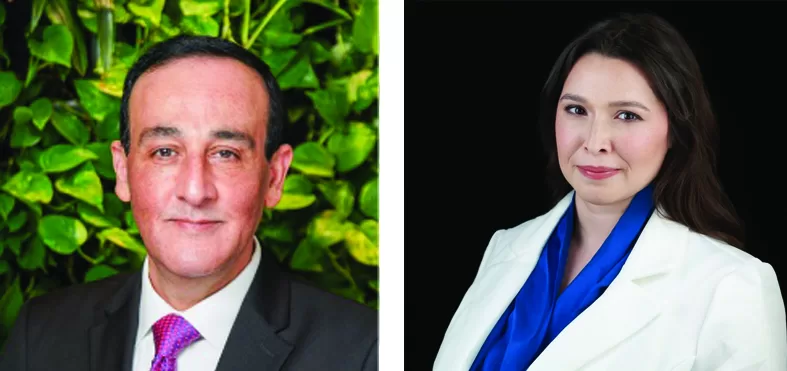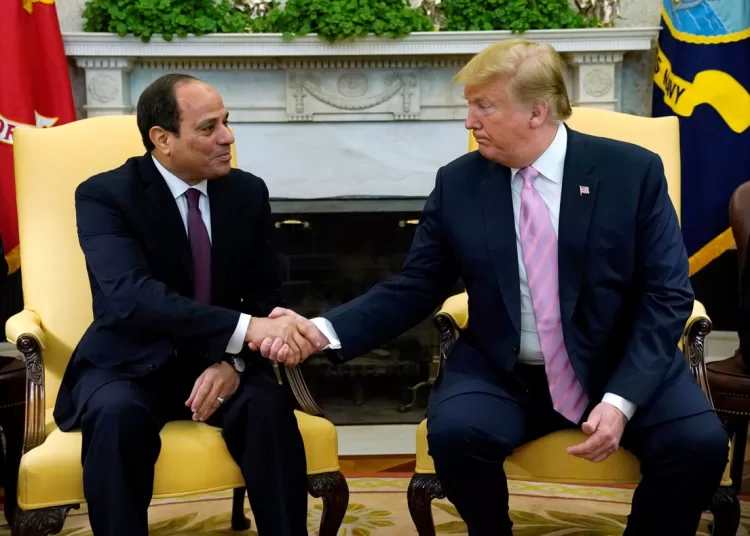Relations between Egypt and the US have evolved through various administrations and geopolitical shifts.
US experts highlight the importance of bilateral ties. Economic engagement and diplomatic cooperation, they said, are key pillars of the partnership between Cairo and Washington.
Dr Frank Musmar, an academic and a political analyst, said Egypt has been a strategic partner of the US for long.
The first term of President Donald Trump, he said, was marked by deepened co-operation, Egyptian President, Abdel Fattah El Sisi fostering a close relationship with the US administration.
Dr Musmar pointed out that trade between the two nations reached $7.3 billion in 2023, with Egyptian exports to amounting to $1.9 billion.
He believes that the presence of a moderate approach to relations between the two countries would ensure the preservation of their strategic partnership.
Washington, he said, can play a vital role in revitalising the Egyptian economy through bilateral debt swaps and multilateral debt relief initiatives.
Meanwhile, Irina Tsukerman, a US national security lawyer, highlighted the renewed diplomatic momentum between the two nations with President Trump returning to the White House.

She referred to President Trump’s hosting of President Sisi at the White House in April 2017.
This, Tsukerman said, marked the first official visit by an Egyptian leader to Washington in eight years.
“This meeting signalled a renewed commitment to strengthening bilateral ties, with both leaders expressing admiration and a desire for closer co-operation,” Tsukerman told the Egyptian Mail.
During Trump’s first time, Egypt and the US advanced their collaboration in energy, security, and regional diplomacy.
Egypt played a pivotal role in the Eastern Mediterranean Gas Forum, first hosted in Cairo in 2019.
The initiative aimed to enhance economic co-operation among regional energy producers and saw renewed US investment and engagement in the future.
Security co-operation is also a defining feature of Egypt-US relations.
Egypt’s role in the Anti-Terrorism Quartet, alongside Saudi Arabia, the UAE, and Bahrain, reinforced its commitment to countering terrorism and ideological extremism in the region.
“Egypt’s contributions to regional security and integration have been crucial, especially in counterterrorism efforts,” Tsukerman said.
“The strong rapport between Presidents Trump and President Sisi facilitated deeper diplomatic and security co-operation, ensuring regional stability,” she added.
She further noted that Egypt’s strategic location and military capabilities make it a key player in Middle Eastern geopolitics.
Economic engagement remains a significant component of bilateral relations, with opportunities for enhanced trade and investment.
According to Tsukerman, President Trump’s “America First” policy emphasises private sector growth.
This, she said, creates potential avenues for Egypt to attract US investments in the coming period.
“The Trump administration’s second term can offer new economic opportunities for Egypt,” she said.
“A multi-dimensional approach involving trade agreements, infrastructure development, and technology investments can help Egypt strengthen its economic foundations,” Tsukerman added.
Both experts agree that US investment in Egypt’s energy sector, including renewable energy projects like solar and wind, can be a game-changer for Egypt’s economic diversification.
Collaboration in natural gas and oil exploration can also further cement economic ties between the two countries.
Beyond trade and security, cultural and educational ties play a vital role in fostering mutual understanding.
“The expansion of educational exchange programmes and scholarships for Egyptian students in the US can deepen people-to-people connections,” Tsukerman suggested.
“Cultural diplomacy, particularly in arts, history, and media, can help strengthen relations at a grassroots level,” she added.
Environmental co-operation is another emerging field where the US and Egypt can collaborate.
Both countries have a shared interest in climate resilience, particularly in water management, desertification, and sustainable agriculture.
By partnering in these areas, the US can support Egypt’s long-term sustainability efforts.
As global trade dynamics shift and geopolitical tensions rise, the trajectory of US-Egyptian relations will depend on how both nations navigate these challenges.
Dr Musmar and Tsukerman emphasize the need for a balanced approach, one that ensures mutual benefits across diplomacy, security, and economic growth.
“The US-Egypt partnership is not just about military or economic ties,” Tsukerman said. “It is a strategic alliance that influences the entire region.”
She expressed hopes that both countries would continue to foster co-operation across multiple sectors to ensure a stable and a prosperous future.





